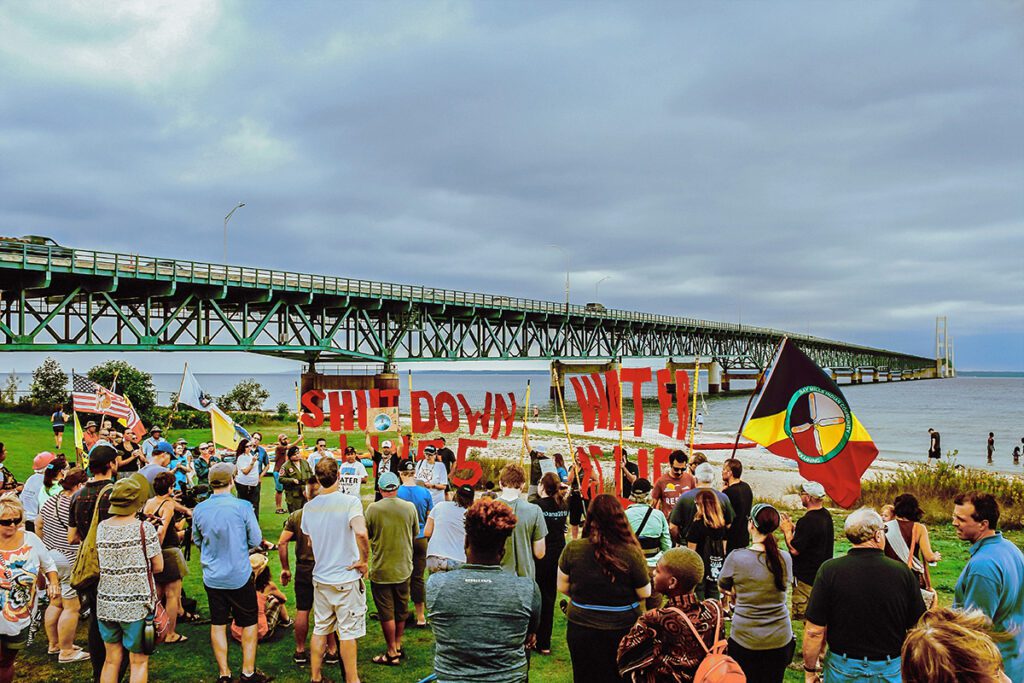
The Native American Rights Fund (NARF) and Earthjustice have teamed up with the Bay Mills Indian Community to stop Enbridge’s Line 5 proposed pipeline that would tunnel under the Straits of Mackinac, a sacred place that Bay Mills and their relatives share with Michigan and the U.S. by treaty. The risky one-of-a-kind project extends the life of a dangerous pipeline through the Great Lakes constructed without Tribal consent.
Enbridge operates the Line 5 pipeline and pursues tunnel project permits in defiance of a 2020 state order to cease operations and despite lacking a valid lease to use the submerged lands. Line 5 has already leaked at least 33 times and discharged more than 1.1 million gallons of oil. In fact, Enbridge in 2014 was responsible for the largest inland oil spill, which polluted Michigan’s waterways with nearly 1 million gallons of oil and permanent impacts felt throughout the spill area. Bay Mills Indian Community has banned the dangerous and unnecessary project from Tribal lands and supports the Michigan Attorney General’s independent lawsuit against the foreign oil and gas giant.
Background:
For the Anishinaabe people of the Bay Mills Indian Community (BMIC) life began in the Michilimackinac (Place of the Great Turtle, with Mackinac being a mistranslation of ‘turtle’), now known as the Straights of Mackinac. The waters where Lake Huron and Lake Michigan meet is a sacred space.
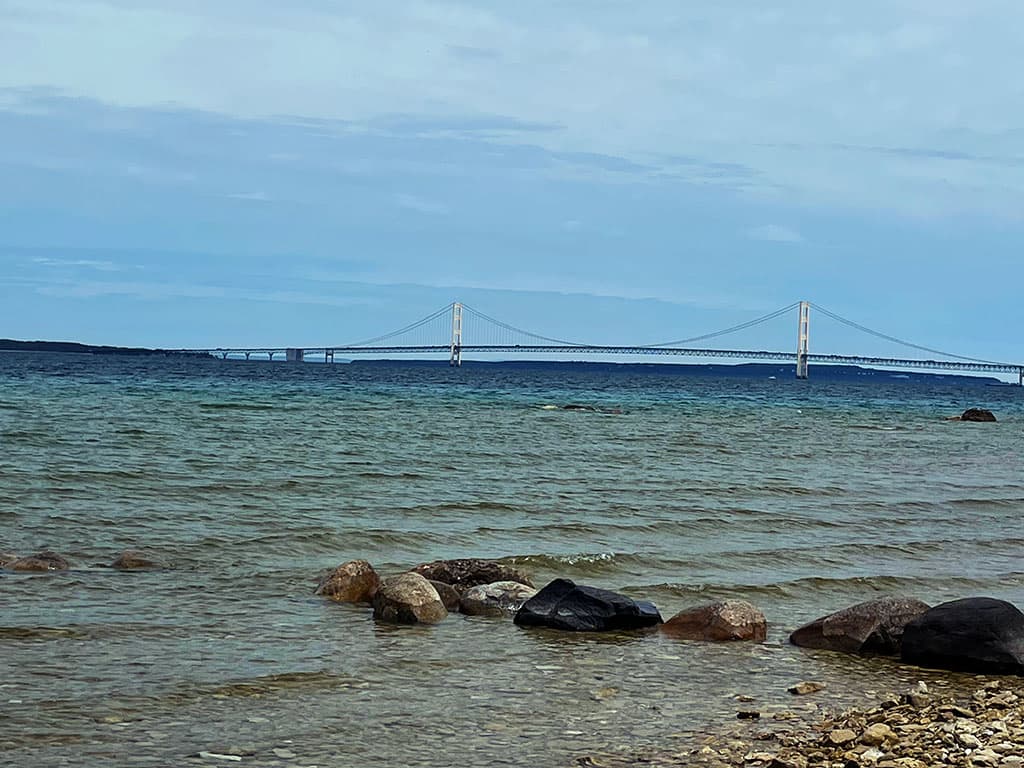
The area remains integral to their daily practice of cultural lifeways and is full of cultural, historic and archaeological sites. It is also known as Gchi Mshiikenh Deh Minising (the Heart of the Great Turtle Island).
From time immemorial to today, communities, local businesses, and Tribal members depend on the abundant fish and wildlife in the Straits of Mackinac as well as a place for prayer and ceremony. Commercial and subsistence fishing and hunting continue to provide economic survival for the majority of the Tribal Nation’s citizens.
In the 1950s, without Tribal consultation and without seeking public input, the State of Michigan granted permission to build the original Line 5 pipeline in spite of the risk of oil spills in the Great Lakes. Now, Enbridge seeks to build a tunnel under the Straits to house the Line 5 oil pipeline and continue transporting non-consumer oil and gas products from one part of Canada to another with great risk but little financial benefit to local residents.

In its pursuit of profits, Enbridge is ignoring that Michigan Governor Whitmer revoked the easement for the dual pipeline to cross the Straits of Mackinac. Enbridge refuses to comply with the Governor’s public safety order to shut down the aging pipeline and Enbridge is now trespassing as it continues to operate Line 5 in violation of the termination notice, just like the way they were found to be trespassing on the Bad River Band reservation.
“It is extremely important for Bay Mills Indian Community to take up this battle against Enbridge” explained Whitney Gravelle, In-House Counsel for Bay Mills Indian Community. “Since time immemorial, the Great Lakes have been an integral part of Bay Mills’ way of life, and they will continue to be an integral part of tribal culture, tradition, and economy for many generations to come. By failing to consider the dangers Line 5 poses to treaty-fishing rights, cultures, and traditions of the Anishinaabe, we risk killing the heart of Turtle Island, the heart of North America.”
Case Updates:
May 2020: Bay Mills seeks to join the Line 5 permit process
On May 11, 2020, NARF and Earthjustice teamed up with the Bay Mills Indian Community to fight Enbridge’s proposed Line 5 pipeline tunnel, which would impact communities, local businesses, and the environment on lands the Tribal Nation shares with the U.S. by treaty.
On behalf of Bay Mills Indian Community, NARF and Earthjustice attorneys filed a Petition to Intervene to participate as a party in the Enbridge Line 5 Tunnel Project proceedings before the Michigan Public Service Commission.
The oil giant claimed that, due to the 70-year-old easement under the Great Lakes, issued in 1953, without any Tribal input, the project could skirt any additional review by the Commission—including any review of environmental impacts. The public was able to submit comments on the request for declaratory ruling till May 13, 2020.
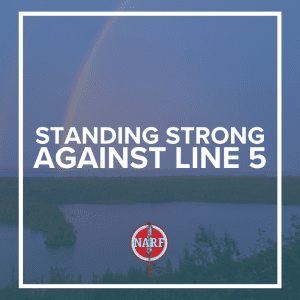
“With their application to move a section of the Line 5 pipeline to a tunnel dug under the Straits of Mackinac, Enbridge proposes a significant project that could have extreme impacts on the area’s waterways and wildlife,” NARF Senior Staff Attorney David L. Gover explained. “The Bay Mills Indian Community relies heavily on fishing in the area, and the Tribe has a treaty-protected right and a responsibility to keep the region’s fisheries healthy and available to Tribal citizens. Over the years, the Tribe has consistently fought to protect their fishing and hunting rights. Today’s filing continues that fight. The Native American Rights Fund is proud to stand with the Nation to ensure that the Bay Mills Community’s fishing lifeways and tribal homelands are adequately protected for generations to come.”
June 2020: Order to temporarily cease operation
On June 25, 2020, a judge granted Michigan Attorney General Nessel’s request for a temporary restraining order. The court ordered Enbridge to immediately cease operation of the approximately 4-mile-long segment of the Line 5 oil pipeline that crosses the bottom of the Straits of Mackinac.
The decision came just a week after Governor Whitmer learned about significant damage to the Line 5 pipeline infrastructure. The state called on Enbridge to disclose all information about the issue. After the oil giant did not respond, Nessel then filed a request for a temporary restraining order to cease operations until the state can conduct a full review and examine all documentation. Enbridge refused to provide BMIC and other Tribal Nations with information on what went wrong and how the corporation placed the waters at risk.
The judge wrote, “the severe risk of harm that may result from Defendants’ operation of the West Line … is so substantial and irreparable, and endangers so many communities and livelihoods and the natural resources of Michigan, the danger far exceeds the risk of financial loss to Defendants.”
BMIC has been on the frontlines of the fight to defend its treaty fishing rights and cultural traditions from yet another oil spill for years. NARF and Earthjustice represent BMIC.
“The court’s decision today was a great step forward in protecting our Great Lakes from this uniquely dangerous pipeline. Bay Mills will not stop until this threat to our waters and treaty rights is removed. In addition, this situation shows once again that Enbridge cannot be trusted to safely operate any pipeline,” said BMIC President Bryan Newland. “Enbridge continues to withhold information from us, from regulators, and from the public. We want to know what they’re hiding and why they’re hiding it.”
According to NARF Senior Staff Attorney David L. Gover, “The court’s decision to put a hold on the damaged Enbridge pipeline is absolutely right. Both the state and the Bay Mills Indian Community are still waiting for information from Enbridge as to what exactly happened last week. The pipeline poses a real threat to the tribe’s water and lifeways. The people deserve to know the risks that Enbridge is taking with their homelands.”
August 2020: Bay Mills intervened in MPSC permitting process
In August 2020, a Michigan administrative law judge granted BMIC the right to intervene in the ongoing pipeline fight that united Tribes, environmental groups and community members against oil giant Enbridge. The decision allowed the Tribal Nation to be a party in the contested case process evaluating Enbridge’s Michigan Public Service Commission’s (MPSC) permit application.
“Enbridge’s Line 5 pipeline puts our treaty rights and our way of life at risk every single day,” said BMIC President Bryan Newland, “We are going to continue to fight to protect our rights, our waters, and our way of life.”
NARF and Earthjustice represent BMIC as an intervening party before the MPSC.
November 2020: Michigan revokes Line 5 Straits easement
On November 13, 2020, Michigan Governor Whitmer and Michigan Department of Natural Resources Director Dan Eichinger notified Enbridge that the state will revoke and terminate the 1953 easement that allowed the oil giant to transport petroleum and other products to Canada through dual pipelines in the Straits of Mackinac. The decision came after years of advocacy and litigation from local tribes and communities that depend on the Straits for their livelihood.
“We are thrilled and thankful for Governor Whitmer’s decision to revoke the easement for Enbridge’s pipeline to run beneath the Straits”, said BMIC President Bryan Newland. “Enbridge has consistently shown that it only cares about its profits and not about the communities of the Great Lakes. This is a monumental first step in rectifying the harm that the company has already inflicted upon Bay Mills and other tribal nations for decades.”
The Governor’s office explained the decision came after reviewing the corporation’s compliance with easement terms. From the official statement: “Today’s action to revoke and terminate the 1953 easement is the culmination of a careful review of Enbridge’s compliance with the easement, the threats posed by the continued operation of the dual pipelines, and the state’s energy supply. On June 7, 2019, the governor issued Executive Order 2019-14, creating the UP Energy Task Force to assess the region’s energy needs and alternative sources of supply. The Task Force issued a report on April 17, 2020. Moreover, on June 27, 2019, the governor directed the DNR to undertake a comprehensive review of Enbridge’s compliance with the 1953 easement. That review is now complete and supports this action.”
December 2020: MPSC recognized Michigan’s revocation of the easement a fundamental change
The Michigan Public Service Commission released a decision on December 9, 2020, that the state’s revocation of the 1953 easement was a “fundamental change” in the agency’s determination whether to issue a permit to Enbridge to construct an tunnel to encapsulate the Line 5 dual pipelines at the Straits of Mackinac. The Commission asked an administrative law judge to consider how the easement revocation affected the scope of its proceeding, including risks of and need for the continued operation of a pipeline through the Great Lakes.
“The Commission’s decision is another important step in an ongoing battle to protect our water. The waters of the Great Lakes are part of our tribe’s identity. These waters are protected by treaty and we depend on healthy water for fishing and sustenance,” said BMIC President Bryan Newland
“More time is needed to consider the impact that the Line 5 Project will have on Bay Mills’ Treaty-protected rights across the length of the pipeline, and in the Great Lakes and Straits of Mackinac,” said NARF Senior Staff Attorney David L. Gover.
February 2021: MPSC limits evidence in permit decision
![Protest sign: People Over Pipelines. Pax Ahimsa Gethen [CC BY-SA 4.0 (https://creativecommons.org/licenses/by-sa/4.0)]](https://narf.org/wordpress/wp-content/uploads/2019/09/protest_pipelines-e1612994924882.jpg)
On February 23, 2021, a Michigan administrative law judge issued a new ruling over the scope of evidence the Michigan Public Service Commission would consider in the hearing over Enbridge’s request for an operating permit for the Line 5 tunnel construction project in the Straits of Mackinac. The opinion revised the October 2020 determination in light of the November 2020 order from Michigan Governor Whitmer to revoke and terminate the 1953 easement that allowed Enbridge to operate the pipeline.
The new ruling excluded evidence concerning whether the American public needs to extend the life of Canada’s Line 5 by constructing a new pipeline tunnel, the environmental risks (i.e., oil spills) of the entire Line 5 pipeline, and the climate change impacts that continuing to operate Line 5 would impose.
“The unfathomable damage that Line 5 could inflict upon our treaty-protected waters, cultural resources, and critical plant and fish populations is too great to justify the pipeline’s continued operation or potential replacement,” said BMIC President Whitney Gravelle. “We are deeply disheartened that today’s ruling will exclude critical evidence about environmental risks and climate change from the scope of the Commission’s permitting consideration, but we remain determined to stop this project from moving forward.”
NARF Senior Staff Attorney David L. Gover concurred, “Today’s ruling is deeply concerning, because evidence related to the public need for this pipeline and the environmental risks of its operation are both essential parts of the decision about whether to approve the tunnel project. We will continue to support Bay Mills and shine a light on the very real threats this project poses to the Tribe’s treaty rights, livelihoods, and cultural resources.”
Earthjustice Attorney Mary Rock, who serves as co-counsel for the BMIC, also found the decision perplexing. She said, “Given the fact that the existing pipeline in the Straits of Mackinac must shut down because of the Governor’s revocation and termination of the 1953 easement, it only makes sense to assess whether building a massive tunnel so that the pipeline can transport oil beneath sensitive and critical waters for decades to come is really necessary and environmentally sound.”
May 2021: Bay Mills Indian Community banishes Line 5 from Tribal lands
On May 10, 2021, Bay Mills Indian Community Executive Council passed a resolution to banish Enbridge Energy, Inc.’s Line 5 dual pipelines from all tribal lands—including the Straits of Mackinac. Reasons for the banishment included:
- Enbridge’s existing system that includes Line 5 has already leaked at least 33 times spilling more than 1,100,000 gallons of oil.
- Enbridge has incurred fines for failing to properly maintain and repair the existing system that includes the Line 5 dual pipeline.
- Enbridge continues operating existing Line 5 pipeline structures under an expired easement and in spite of years of tribal and public opposition.
Tribal governments do not enact banishment lightly. This historical and customary form of Tribal law has existed since time immemorial. Tribal Nations exercise banishment only to address especially egregious acts of harm to the community.
“Banishment is a permanent and final action that is used to protect all that we hold dear. Enbridge’s continued harm to our treaty rights, our environment, our history, our citizens, and our culture, is a prime example of how banishment should be used,” said BMIC President Whitney Gravelle.
The banishment resolution requests that any regulatory body with oversight authority enforce the banishment. This includes the Chippewa Ottawa Resource Authority, Grand Traverse Band of Ottawa and Chippewa Indians, Little River Band of Ottawa Indians, Little Traverse Bay Bands of Odawa Indians, Sault Ste. Marie Tribe of Chippewa Indians, the State of Michigan, and the United States.
“While the pipeline segment beneath the Straits has thankfully not burst, in 1999, the pipeline leaked 226,000 gallons of crude and natural gas liquid, forcing 500 residents to evacuate,” added Gravelle. “Line 5 has spilled 33 times since 1968, leaking over 1.1 million gallons of oil. And those are just the documented spills.”
In November 2020, Gov. Gretchen Whitmer ordered Enbridge to cease operations by May 12. More than a year later, Enbridge still refused to comply with the order. The dispute over the easement revocation continued in federal court. Bay Mills Indian Community filed an amicus brief in State of Michigan and Michigan Department of Natural Resource v. Enbridge Energy, supporting remand to state court.

On behalf of BMIC, Earthjustice, with NARF’s assistance, also challenged a permit issued by the Michigan Department of Environment, Great Lakes, and Energy allowing Enbridge to build a massive tunnel beneath the Straits of Mackinac to house a new segment of its Line 5 pipeline.
June 2021: Army Corps requires an Environmental Impact Study
On June 23, 2021, the U.S. Army Corps of Engineers announced it would conduct an environmental impact study (EIS) on the Enbridge Energy Inc. plan to build an underground tunnel under the Great Lakes to house the Line 5 oil and gas pipeline. BMIC welcomed an examination of how the company’s plan would impact this sacred area located between Michigan’s upper and lower peninsulas.
“The U.S. Army Corps of Engineers recognizes the federally mandated responsibility to thoroughly investigate the impacts Enbridge would create by tunneling under the Great Lakes,” said BMIC President Whitney Gravelle. “An environmental review is vital as the Straits of Mackinac are a treaty-protected spiritual and sacred space that provides income and food resources for Native and non-Native communities alike. Every community requires clean water, air, and soil as well as healthy fish, game, and plant populations to survive. Our ancestors understood this common human need when they negotiated the Treaty of March 28, 1836, with the United States. By treaty, we agreed to share part of our Tribal lands with the United States and what became the State of Michigan but we reserved continued Tribal-use of our treaty-protected resources, including in the Straits of Mackinac.”
Lake Michigan and Lake Huron converge at the Straits at the narrowest point between the upper and lower part of Michigan. BMIC and other Anishinaabe peoples of the region consider the Straits a sacred place on Turtle Island.
“The Enbridge Line 5 tunnel and continued operation of the pipeline has the potential to cause profound damage to the Straits of Mackinac. The impacts need to be thoroughly studied and the necessary protections and alternatives identified,” said NARF Senior Staff Attorney David L. Gover.
A long history of environmental damage caused by Enbridge’s continued operations throughout the area led to BMIC banishing Enbridge’s Line 5 from Tribal territories and the State of Michigan to revoke orde a Line 5 shutdown citing: “unreasonable risks of continued operation” and potential impact on Tribal Treaty rights at the Straits. Governor Whitmer demanded that Line 5 operations cease by May 12, 2021.
“Throughout its length, the pass-through Line 5 pipeline system puts people and ecosystems at risk of more oil leaks and spills,” said Gover. “At the Line 5 portion where Enbridge proposes an underwater pipeline tunnel, the Anishinaabe people and many local residents currently depend upon the health of the Straits of Mackinac to support commercial and subsistence fishing and hunting. For millennia human beings have lived, fished, and hunted at this sacred waterbody with a feeling of respect to be alive and present in such a unique place. Oil leaks and spills into the Great Lakes would be tragic.”
September 2021: Experts sound alarm on Line 5 tunnel impacts
BMIC, Tribal citizens, climate scientists, and academic experts submitted written testimony to the Michigan Public Service Commission (MPSC) in September 2021. Expert testimony explained the climate change and grave impacts that Enbridge would cause if MPSC allowed the Canadian company to construct a new Line 5 oil pipeline tunnel under the Great Lakes to transport oil and gas from one part of Canada to another.
BMIC President Whitney Gravelle submitted testimony describing the negative impacts the project would have to the waters and land in and around the Straits of Mackinac and the Great Lakes, which the Tribe has reserved access to through treaty for fishing, hunting, and gathering. “It is dangerous to construct a tunnel and route a pipeline through lands and waters that are central to our existence as Indigenous people and as a Tribal Nation,” wrote Gravelle. “The project poses a serious threat to our treaty rights, our cultural and religious interests in the Great Lakes, our economy, and the health and welfare of our Tribal citizens.”
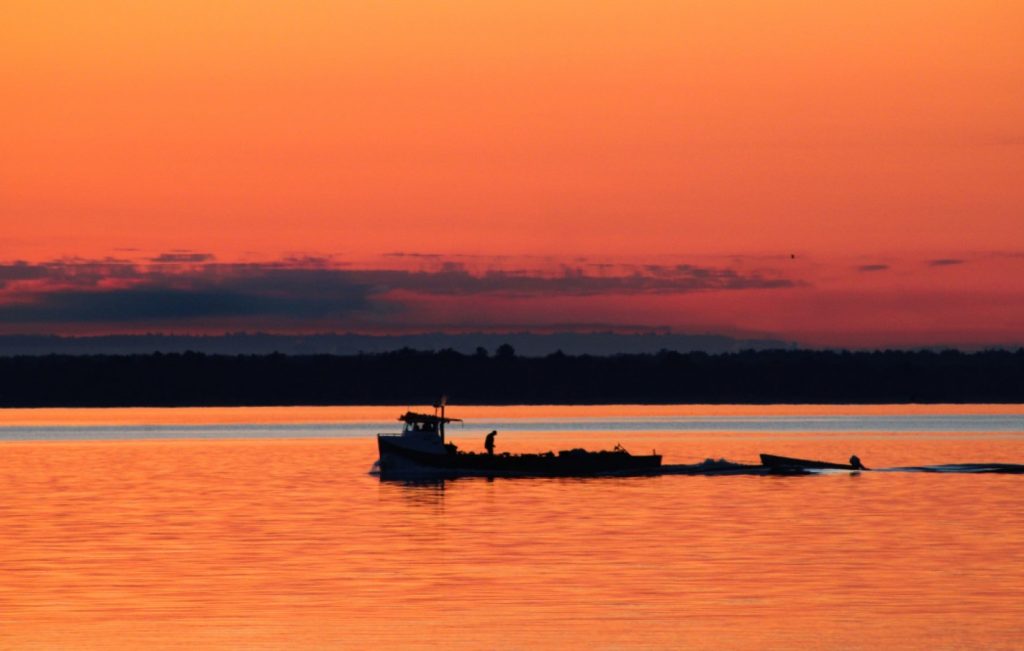
Enbridge has a long-documented record of oil leaks that have caused environmental damage to Tribal lands and treaty-reserved gathering, hunting, and fishing. Though Michigan had revoked Enbridge’s bottomlands easement in 2021, due to the corporation’s repeated violations of the easement agreement, Enbridge continued to operate Line 5 illegally in the Straits of Mackinac while seeking approval from the Commission to build a pipeline tunnel underneath the lakebed. If approved by MPSC, the tunnel would allow Enbridge to operate the pipeline for decades, perpetuating greenhouse gas emissions and further jeopardizing the lifeway of Tribal communities native to the Great Lakes Basin.
Several academic experts underscored how numerous species critical to the Upper Peninsula’s larger ecosystem and economy already struggle to adapt to warming temperatures due to the effects of climate change. Since 1985, the “lakes in the Great Lakes region have warmed more than the global average,” the experts’ testimony states.
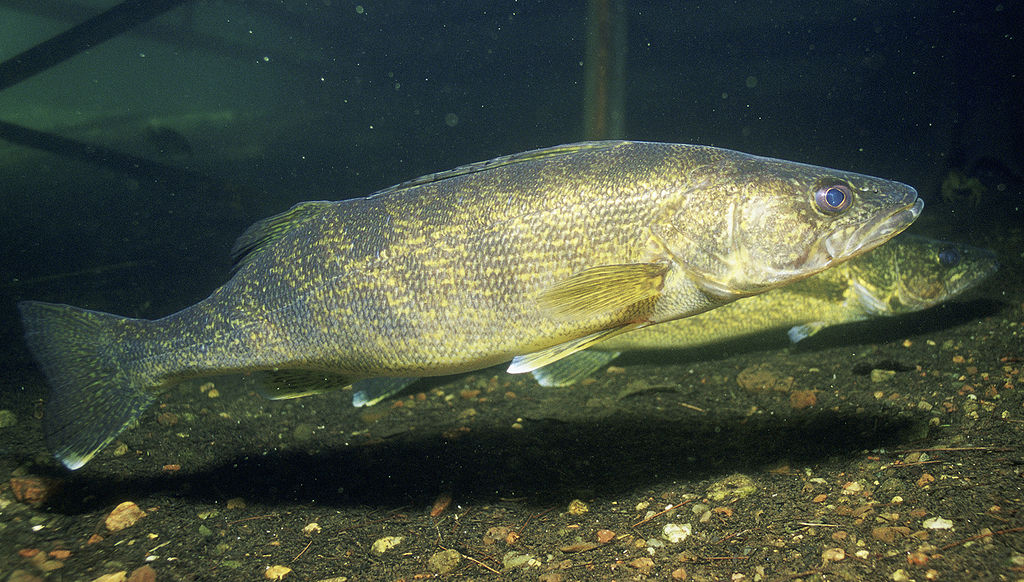
This warming has forced many species, including Walleye fish that support Tribal subsistence, commercial, and recreational fisheries, to live in warmer, less-favorable environments. Experts also highlighted the rapid loss of wild rice, a crop revered as an “irreplaceable cultural, spiritual, nutritional, and commercial resource and sacred relative” to Native peoples in Michigan.
Expert climate change witnesses submitted written testimony detailing their concerns about the tunnel project’s detrimental climate impacts. Director and Senior Economist of the Applied Economics Clinic Elizabeth A. Stanton, Ph.D., explained how shutting down Line 5 and not building a replacement was a “reasonable and prudent” alternative in light of the pressing need to shift to clean energy sources.
January 2022: Tribal voices sidelined in permitting process
On January 13, 2022, an administrative law judge in Michigan excluded valuable witness testimony from the information the Michigan Public Service Commission (MPSC) should consider as it deliberated the issuance of a permit for the proposed Enbridge Line 5 pipeline tunnel. In his ruling, the judge granted Enbridge’s request to strike from the record portions of testimony about serious risks that the tunnel poses to public safety, climate change, and Tribal sovereignty.
BMIC intervened in the review process to alert the public service commission about threats that a new pipeline tunnel would pose to the Tribe’s food and water, medicinal plant species, economic livelihood, and treaty rights. The Tribe has lived along the Straits of Mackinac since time immemorial and retains treaty-protected access for hunting, fishing, and cultural traditions.
Portions of the excluded testimony explained the cultural and spiritual significance of the Straits to the Anishinaabe people and stressed the catastrophic impact an oil spill in these waters would have on every aspect of their existence:
“The Straits of Mackinac is a place of deep spiritual and cultural meaning to my people, where there are important cultural and historic resources still being learned of, and where Bay Mills and other Tribal Nations have Treaty rights,” testified BMIC President Whitney Gravelle. “It is dangerous to construct a tunnel and route a pipeline through lands and waters that are central to our existence as Indigenous people and as a Tribal Nation.”
Photo of Bay Mills Point by Whitney Gravelle.
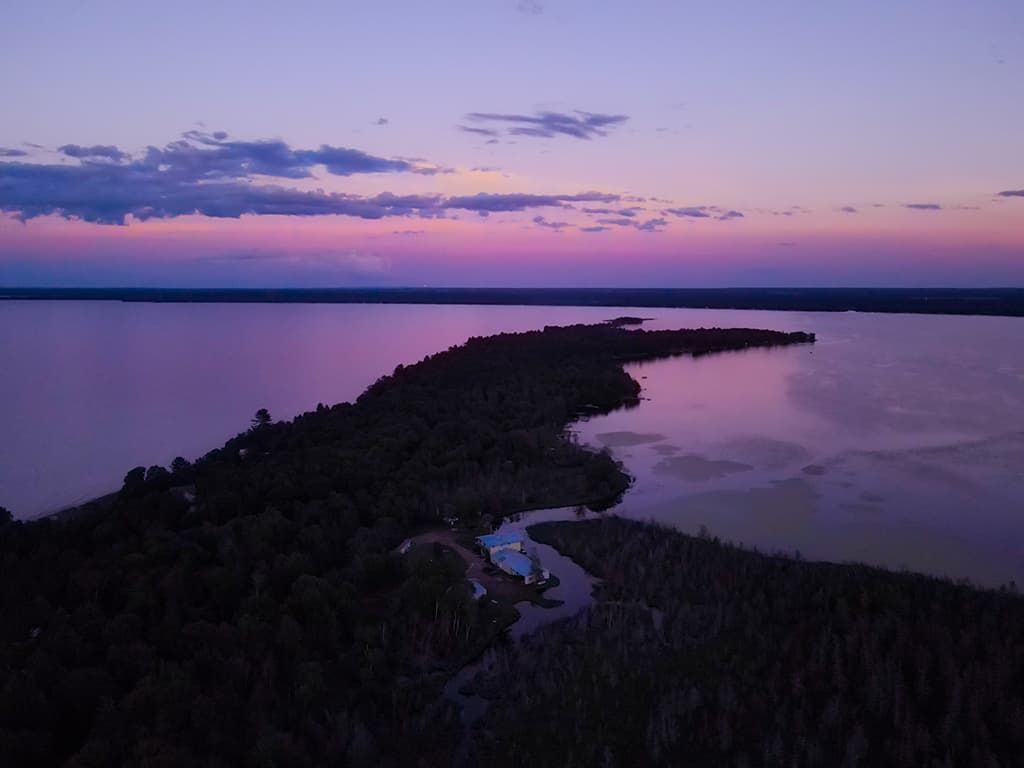
The administrative law judge also struck a portion of the testimony from BMIC Vice President Jacques Leblanc, a lifelong commercial fisherman who detailed the ecological, economic, and cultural impacts of a spill in the Straits:
“If the Great Lakes ecosystem is harmed, I will have no means to continue supporting my family through treaty subsistence and commercial fishing or harvesting of medicines and animals,” testified BMIC Vice President Leblanc. “Beyond the harm that an oil spill or other event would have on the health of lake trout and whitefish, any disruption of the fishery for an extended period would stifle the transfer of fishing knowledge to younger generations.”
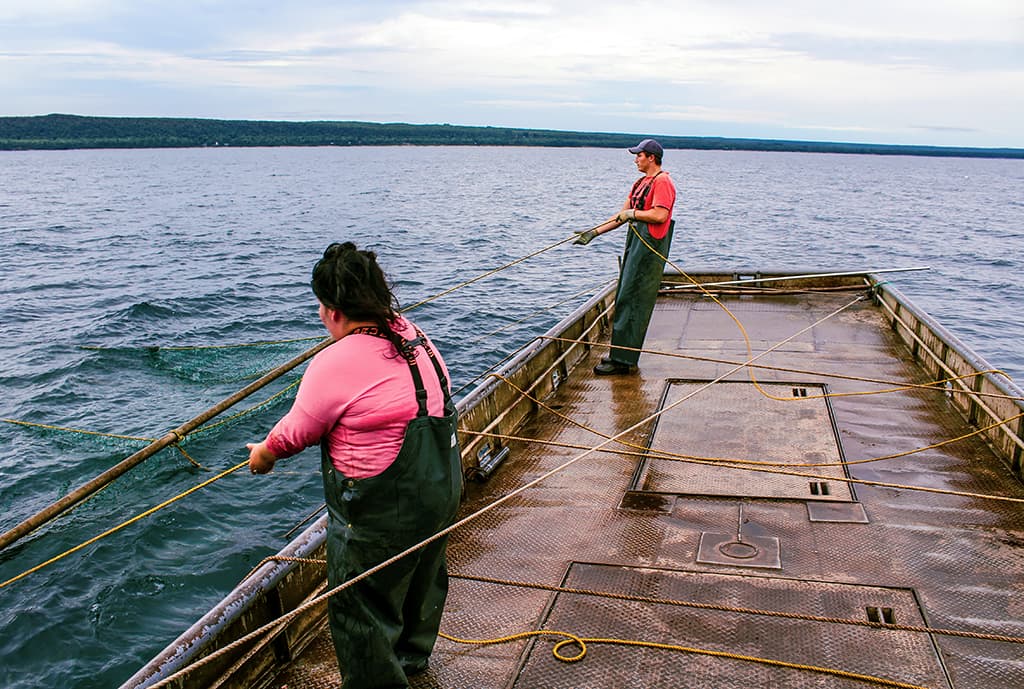
On a positive note, the judge allowed the testimony of chemical engineer and pipeline expert Richard Kuprewicz who testified about the serious risk of an explosion in the proposed underwater pipeline tunnel to remain on record. This means the MPSC must consider how Enbridge’s proposed tunnel design could cause a loss of human life for workers in the tunnel, an oil spill in the Great Lakes, and an environmental catastrophe in the Straits should the volatile mix of fuel and ignition sources encased in a Line 5 oil pipeline tunnel explode.
“As a public agency, the Michigan Public Service Commission needed to know the critical information these witnesses presented for consideration on behalf of the impacted tribal communities. In the next few months, MPSC will now have to weigh the value of increased corporate profit for Enbridge against the impacts, risks, and damages a Line 5 oil pipeline tunnel would cause for the public, while hearing only part of the story,” said NARF Senior Staff Attorney David L. Gover.
February 2022: Commission considers permit for proposed pipeline tunnel
The week of February 14, 2022, a coalition of Tribal Nations, public safety experts, and environmental groups brought together a variety of powerful arguments as they petitioned the Michigan Public Service Commission (MPSC) to deny a permit for the Enbridge Line 5 tunnel project. The groups underscored the serious risks a tunnel in the Straits of Mackinac would pose to Tribal treaty rights, public safety, and to combatting the climate crisis.
The Bay Mills Indian Community (BMIC) has lived along the Straits of Mackinac for centuries and retains treaty-protected access to the waterway. One of the intervening parties opposing the project, the Tribe has been a vocal opponent of the existing pipeline and tunnel replacement and has had been battling Enbridge for nearly a decade.
The BMIC stressed to the Commission how constructing an underwater tunnel to transport crude oil through such ecologically sensitive waters poses an untenable risk to its frontline Indigenous communities, fish populations, sacred burial sites, and medicinal plant species.
“The Straits of Mackinac are a precious and culturally sacred part of our ecosystem that should not be jeopardized in the name of corporate greed,” said BMIC President Whitney Gravelle. “It’s more than just our food and water that’s at stake. It’s our connectedness to the natural world, our cultural identity, and deep sense of community that this landscape keeps alive. This is not just a tribal fight; we are fighting on behalf of all who value the Great Lakes and our environment,”
Due to the proposed tunnel design, the likelihood of a catastrophic explosion that would cause irreparable harm to the Great Lakes and to surrounding communities is also a serious concern. “Enbridge’s proposal to run a liquids pipeline through an enclosed tunnel has never been done before and creates the conditions for a catastrophic explosion in the Straits,” said Christopher Clark, attorney with Earthjustice, which represents the Tribe before the public service commission along with the NARF. “This is not the right time or right place for such a dangerous experiment.”
“Climate change is disproportionately ravaging the natural resources, economic livelihoods, and safety of the Tribal Nations located in Michigan,” said NARF Senior Staff Attorney David L. Gover. “These are the very same communities that are bearing the brunt of the unacceptable risks posed by the existing Line 5 pipeline and this tunnel replacement.”
For the first time in Michigan history, the potential climate impacts of proposed fossil fuel infrastructure are being considered under the Michigan Environmental Protection Act (MEPA) during a separate but simultaneous permit hearing. That hearing is also before the MPSC.
“This decision to allow consideration of potential climate impacts sets precedent that climate change is within the scope of MEPA,” said Environmental Law Policy Center Senior Attorney Margrethe Kearney. “This means, moving forward, MEPA can be a much more powerful tool in preventing investments in fossil fuels that create a worst-case climate scenario.”
July 2022: Agency requests more information on pipeline tunnel risks
In July 2022, Michigan Public Service Commission requested additional information concerning the safety risks posed by the Enbridge Line 5 pipeline segment in the Straits of Mackinac and its proposed tunnel replacement. The Commission’s order came on the heels of reports from frontline Tribal Nations about the health, safety, and financial risks to the Great Lakes Basin. Pipeline safety expert Richard Kuprewicz also underscored to the Commission the increased likelihood of an explosion in the Straits when transporting crude oil through a tunnel, which would have catastrophic impacts to water supply, wildlife, and air quality.
“Any decision that may jeopardize the very livelihoods of Tribal Nations deserves serious and careful consideration,” said BMIC President Whitney Gravelle. “The Straits are the center of creation for our people, and the construction of a tunnel through this sacred area endangers our livelihoods, our fisheries, and our culture. Every day that the Line 5 dual pipelines continue to pump oil and gas through the Great Lakes amounts to a violation of our treaty-protected rights and an acceleration of climate change. We must stop the tunnel project and shut down Line 5.”
NARF Senior Staff Attorney David L. Gover agreed, stating: “I am hopeful that the Commission will join Tribal and state governments in guarding public safety, the local economy, and the Great Lakes ecosystem from a risky and unnecessary project.”
February 2023: MPSC learns proposed tunnel creates explosion risks
On Feb. 3, 2023, the Michigan Public Service Commission (MPSC) received testimony that Enbridge’s plan to dig a pipeline tunnel beneath the Straits of Mackinac could create a catastrophic explosion. Geologist and engineer Brian O’Mara and pipeline safety expert Richard Kuprewicz testified that the release of oil from such an explosion would devastate the freshwater, wildlife, and shorelines of Great Lakes.
“I am very concerned about a methane explosion occurring in the proposed tunnel,” wrote engineering consultant Brian O’Mara in his testimony. “A methane explosion in a confined space like the tunnel project would be like a shotgun blast….”
The experts identified two sources of flammable gas present that could set off an explosion under the Straits: the crude oil and natural gas liquids transported through Line 5 and methane that could leak into the tunnel through groundwater. The testimony came almost two years after Enbridge received a state order to shut down the existing Line 5 dual pipelines due to the company’s “persistent and incurable” safety violations.
After Kuprewicz flagged the serious risk of an explosion in the tunnel during a hearing last year, the Commission ordered Enbridge to provide more details about the tunnel’s safety features. Instead, Enbridge submitted a probability analysis in an attempt to dismiss the concerns as unlikely to occur.

Kuprewicz explained that downplaying the risks of an explosion in the tunnel project undermines federal pipeline safety regulations. “An operator who adopts this approach to the construction and operation of a pipeline will inevitably drive the line toward failure,” wrote Kuprewicz.
BMIC President Whitney Gravelle wrote in her additional testimony that Enbridge’s analysis “does not negate that fact that it could happen in year one of operation, or year two of operation, or year 99 of operation […] All it takes is one time and one spill to destroy my people and destroy all that we hold dear.”
May 2023: UN recommends the shut down Line 5
The United Nations Permanent Forum on Indigenous Issues (UNPFII) released the report from its April 2023 session, where BMIC and the Anishinabek Nation rebuked the Canadian government for protecting the Enbridge Line 5 pipeline. The report recommended that Canada and the United States decommission the Line 5 pipeline because of its impact on the region’s Indigenous communities.
The pipeline, which snakes oil and gas products from one part of Canada to another for processing, takes a short-cut through the Great Lakes in the United States. The route threatens the health and safety of Tribal and other communities along its path.
At the time of the report, the aging Line 5 pipeline already had leaked at least 33 times and discharged more than 1.1 million gallons of oil. The UNPFII 2023 report states:
“The Permanent Forum calls on Canada to re-examine its support for the Enbridge Line 5 oil pipeline, which jeopardizes the Great Lakes in the United States. The pipeline presents a real and credible threat to the treaty-protected fishing rights of Indigenous Peoples in the United States and Canada. The Permanent Forum recommends that Canada and the United States decommission Line 5.”
The Canadian government used diplomatic and legal channels to keep Line 5 operational. Canada’s advocacy intensified after Michigan Governor Whitmer determined that—for public safety—Enbridge should decommission the segment running through the Straits of Mackinac. The corporation ignored the Governor’s order and continues to operate Line 5 without a valid state easement. The Canadian government supported Enbridge in court proceedings.
“The U.N. Permanent Forum on Indigenous Issues recommendation adds to the chorus of voices demanding the decommissioning of Line 5. I hope President Biden and Prime Minister Trudeau hear everyone urging them to choose people over profit and protect 84% of North America’s fresh water from the risk of an oil spill, for their nations, our frontline communities, and the planet,” said BMIC President Whitney Gravelle.
Line 5 is an existential threat to treaty-protected rights, resources, and the fundamental way of life of the Anishinaabe people. Accordingly, all twelve Tribal Nations located in Michigan oppose the continued operation of Line 5 and support its decommissioning.
“One oil spill in the Great Lakes would be devastating to our home and way of life,” said BMIC President Gravelle.
September 2023: More than 60 Tribal Nations oppose Line 5
A coalition of more than 60 Tribal Nations from across the Midwest and Canada led by BMIC weighed in on Michigan Attorney General Dana Nessel’s lawsuit to remove the Line 5 oil pipeline from the heart of the Great Lakes. The Tribes submitted an amicus brief supporting Nessel’s claims in asking the U.S. Court of Appeals for the 6th Circuit to remand Nessel v. Enbridge to state court, a move opposed by the Canadian giant Enbridge, which reaps profits from Line 5. Line 5 is an outdated oil and gas pipeline that poses unacceptable risks of a spill, especially as it travels along the lakebed through the Straits of Mackinac in a four-mile section known as the dual pipelines.
“Near and far, Anishinaabe people have united to protect the Great Lakes,” said Bay Mills Indian Community President Whitney Gravelle. “We stand behind Attorney General Nessel because we know that shutting down Line 5 is the only way to protect everyone who depends on the land, water, and natural resources within the Great Lakes, including Anishinaabe people exercising our treaty rights.”
Not only do the Great Lakes provide fresh drinking water to more than 40 million people, but in the creation stories of the Anishinaabe, the Straits of Mackinac are where the Great Turtle emerged after a flood to create the North American continent, which the Anishinaabe refer to as “Turtle Island.” Bay Mills and other Tribal Nations have hunted, fished, and gathered medicines in the Straits for thousands of years—since time immemorial. In 1836, they ceded vast acres of land and water including the Straits to the U.S. government, but kept the right to continue to use the ceded land.
“That 1836 treaty guarantees these Tribes the right to maintain their way of life in the ceded territory—a right that will be irrevocably destroyed if an oil spill from the dual pipelines contaminates the waters and aquatic life of the Straits,” said Native American Rights Fund (NARF) Senior Staff Attorney David Gover.
Nessel sued Enbridge in Ingham County Circuit Court in June of 2019, alleging that Enbridge is violating the Michigan Environmental Protection Act (MEPA), state public nuisance laws, and the public trust doctrine by operating Line 5 in the Straits of Mackinac. Although the case has been ready for a decision by the state court for more than two years, Enbridge has prolonged it by attempting to move the case to federal court, despite missing the deadline by more than 850 days.
“Enbridge is plainly trying to game the system, but no oil company is above the law,” said Earthjustice Associate Attorney John Petoskey. “The 6th Circuit should remand this case to state court, where the attorney general’s claims can be swiftly resolved.”
NARF and Earthjustice represent Bay Mills Indian Community, Fond du Lac Band of Lake Superior Chippewa, Grand Traverse Band of Ottawa and Chippewa Indians, Keweenaw Bay Indian Community, Lac Vieux Desert Band of Lake Superior Chippewa Indians, Little River Band of Odawa Indians, Little Traverse Bay Bands of Odawa Indians, Match-E-Be-Nash-She-Wish Band of Pottawatomi, Nottawaseppi Huron Band of the Potawatomi Tribe, Saginaw Chippewa Indian Tribe, Sault Ste. Marie Tribe of Chippewa Indians, Bad River Band of the Lake Superior Chippewa, Grand Portage Band of Lake Superior Chippewa, Ho-Chunk Nation, Lac du Flambeau Band of Lake Superior Chippewa Indians, Leech Lake Band of Ojibwe, Menominee Indian Tribe of Wisconsin, Mille Lacs Band of Ojibwe, Minnesota Chippewa Tribe, Prairie Island Indian Community, Red Cliff Band of Lake Superior Chippewa, Red Lake Band of Chippewa Indians, St. Croix Chippewa Indians of Wisconsin, Stockbridge-Munsee Community Band of Mohican Indians, and the Anishinaabek Nation of Ontario as amici in this case.
The Tribes and First Nations are based in Michigan, Wisconsin, Minnesota, and Canada. All 12 of Michigan’s federally recognized Tribes have passed resolutions calling to decommission Line 5.
December 2023: MPSC approves a permit for disastrous Line 5 oil tunnel under Great Lakes
On December 1, 2023, the Michigan Public Service Commission (MPSC) granted Canadian oil giant Enbridge a permit to replace the existing Line 5 dual oil pipelines in the Straits of Mackinac with an untested underground pipeline tunnel. BMIC fought to prevent this outcome in a lengthy contested case before the MPSC. Safety experts warn that the tunnel project could lead to a massive explosion and an oil spill in the heart of the Great Lakes, which hold 84 percent of North America’s surface freshwater.
BMIC and their legal partners condemned the decision.
BMIC President Whitney Gravelle: “Instead of complying with a Governor’s public safety order to decommission Line 5 in Michigan, individuals working at a state agency granted Enbridge a permit for a project for which they hold no property rights and no safety track record in good standing. Today’s decision is another notch in a long history of ignoring the rights of Tribal Nations. We must act now to protect the peoples of the Great Lakes from an oil spill, to lead our communities out of the fossil fuel era, and to preserve the shared lands and waters in Michigan for all of us.”
NARF Senior Staff Attorney David L. Gover said: “While Enbridge Energy may have a permit from a state agency to proceed, the idea to build a pipeline tunnel under the Great Lakes at the Straits of Mackinac remains unsound and too risky. The proposed project still needs other permits to move forward. We cannot allow one corporation to imperil the ecosystems and lives of all those that live nearby or depend on the Straits for their well-being.”
BMIC also challenged a separate permit for the tunnel project that was granted in 2021 by Michigan’s Department of Environment, Great Lakes and Energy (EGLE). BMIC was also engaging with the U.S. Army Corps of Engineers, which planned to release a draft EIS in spring or summer of 2025.
December 22, 2023: Four Tribal Nations Appeal MPSC Decision

BMIC, Grand Traverse Band of Ottawa and Chippewa Indians, Little Traverse Bay Band of Odawa Indians, and Nottawaseppi Huron Band of the Potawatomi have lived on the lands of present-day Michigan since time immemorial. The four Tribal Nations have vigorously opposed the Line 5 tunnel project before the Michigan Public Service Commission.
On December 22, 2023, the four Tribal Nations filed notice that they will appeal the MPSC approval of a permit for Canadian oil giant Enbridge to build the Line 5 tunnel project beneath the Straits of Mackinac.
A statement from BMIC President Whitney Gravelle:
“The MPSC made a bad decision, plain and simple. Although we fought to be heard, they put on their blinders and chose to ignore the critical perspective of Tribal Nations throughout the Great Lakes. Indigenous communities have not once been consulted since 1953 when this pipeline was first constructed. Let me be clear: Line 5 remains a threat to not only the tribes, but anyone and everyone who utilizes the Great Lakes. The question is not if the pipeline will leak, it is when.
Studies show that Line 5 could be decommissioned with almost no impact on jobs, gas prices, or fuel supply. Yet the MPSC did not even pause to ask if we still need this pipeline. Instead, they approved a permit to extend the life of Line 5 for another century. They are prolonging the danger of another oil spill in the Great Lakes, the source of 84 percent of North America’s surface freshwater.
The tunnel project is based on a flawed design that has never been tried anywhere else and would produce a mountain of waste rock as tall as a twenty-story building and as long as a football field. Worst of all, it would perpetuate the transfer of 23 million gallons of oil per day just when we need to switch to clean energy sources. The MPSC’s decision is a disaster for all of us.
It’s important to remember that Enbridge does not yet have the final permit they need from the US Army Corps of Engineers to build the tunnel project. As we appeal the MPSC’s disastrous decision, we also demand and expect that the Army Corps conduct a thorough and meaningful environmental impact statement and uphold the treaty trust responsibilities of the United States. We cannot allow history to repeat itself through the destruction of sacred land for private profit. “
Enbridge’s proposed tunnel project is opposed by multiple Tribes, businesses, and environmental groups. Line 5 was operating in violation of a shutdown order from the Governor of Michigan and in unlawful trespass on the reservation of the Bad River Band of Lake Superior Chippewa in Wisconsin.
April 2024: Michigan Tribes ask court to overturn permit
On April 11, 2024, four Tribal Nations filed a brief asking the Michigan Court of Appeals to overturn the Michigan Public Service Commission’s (MPSC’s) recent approval for Canadian oil giant Enbridge to build the Line 5 tunnel project beneath the Straits of Mackinac. The tunnel project would extend the operational life of the pipeline, pumping oil through the middle of the Great Lakes for decades. The Tribes argue that the Commissioners unlawfully barred key evidence about the public need for Line 5 and about the risk of future oil spills along the pipeline’s length.
“We agree the dual pipelines must be removed from the Straits, but the Commissioners never considered that Michigan does not need to keep this pipeline operating at all. They’ve simply acted as a rubber stamp for Enbridge, gambling our most important resource for the sake of foreign oil profits. Every Tribal Nation and ever Michigander deserves better than this,” said BMIC President Whitney Gravelle
Since it was constructed in 1953, Line 5 has spilled more than 1.1 million gallons of oil. The Commission barred the Tribal Nations from submitting evidence about the history of spills and the risks that Line 5 presents.
NARF and Earthjustice filed the challenge on behalf of the Bay Mills Indian Community, Grand Traverse Band of Ottawa and Chippewa Indians, Little Traverse Bay Band of Odawa Indians, and Nottawaseppi Huron Band of the Potawatomi, who have lived on the lands of present-day Michigan since time immemorial. Six other organizations, including national and local business and environmental groups, are also challenging the permit.
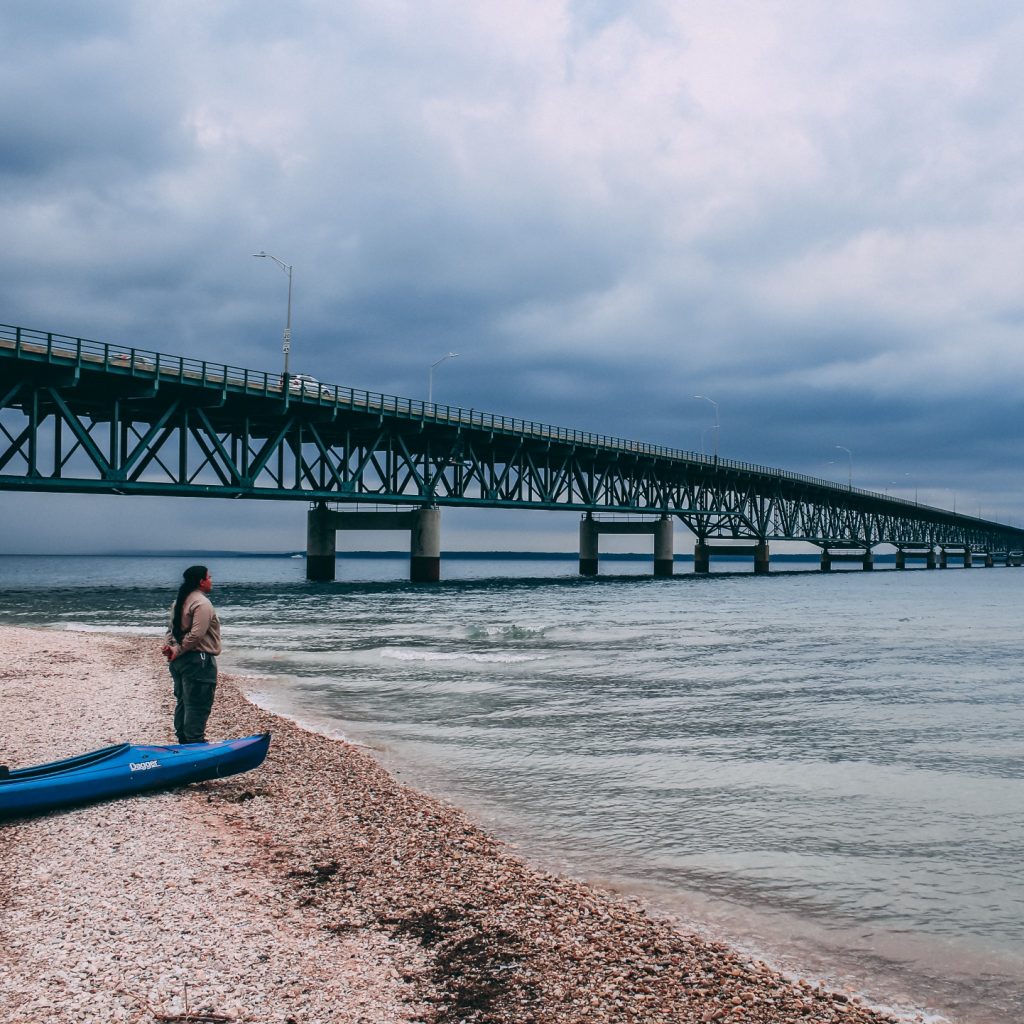
Enbridge’s own analysis showed that Line 5 could be decommissioned with almost no impact on Michigan gas prices, a decision that would also hasten the state’s transition to clean energy sources. Yet the MPSC refused to allow the Tribal Nations to submit evidence on these topics.
September 2024: Enbridge must re-apply for wetlands permit
The Michigan Department of Environment, Great Lakes, and Energy (EGLE) granted Enbridge a wetlands permit in 2021, which would have expired on February 25, 2026. NARF and Earthjustice represented BMIC in challenging the granting of the EGLE permit (Petition: MOAHR 21-008197) which EGLE granted in the absence of information about impacts that affect the Tribal Nation and its citizens. However, Enbridge’s EGLE permit will expire before the U.S. Army Corp of Engineers completes a final Environmental Impact Statement and Record of Decision, both of which must happen before Enbridge could use the EGLE permit to begin construction.
In September 2024, BMIC and Enbridge agreed to a stipulated dismissal of the contested permit case before the Michigan Office of Administrative Hearings and Rules. Enbridge agreed to not rely on the contested EGLE permit and is expected to apply for a new permit.
“Enbridge needs to provide an accurate picture of how constructing a tunnel under the Great Lakes at the Straits of Mackinac would damage wetlands habitat. A new permit application gives EGLE the opportunity to conduct a thorough review of the project’s impacts, which the Bay Mills Indian Community has been requesting for years,” said NARF Senior Staff Attorney David L. Gover.
October 2024: Briefing concludes for MPSC appeal
On October 3, 2024, Tribal intervenors and appellants filed their replies, concluding the briefing for the appeal of the Michigan Public Service Commission’s December 2023 issuance of a permit to Enbridge for the Line 5 pipeline tunnel project. The proposed Line 5 tunnel project threatens natural, cultural, and economic resources in the Straits of Mackinac and throughout Michigan that have vital importance to intervenor-appellants BMIC, Grand Traverse Band of Ottawa and Chippewa Indians, Little Traverse Bay Band of Odawa Indians, and Nottawaseppi Huron Band of the Potawatomi.
The MPSC approved the tunnel project permit without the benefit of a full and fair record. MPSC prohibited Tribal Nations from submitting entire categories of evidence. The Commission barred intervenors from conducting discovery and putting forth expert testimony on both the question of public need for the petroleum products transported through Line 5 and the environmental impacts related to Line 5’s operation in Michigan. The Michigan Environmental Protection Act requires the MPSC to consider those impacts.
“The Michigan Public Service Commission lacked a full and fair record of the public’s needs and the damage such a risky project could cause to the survival of Tribal Nations and Michiganders. A new tunnel under the Straits of Mackinac puts everyone in the Great Lakes region at dire risk: everyone needs clean drinking water and no one wants an oil and gas pipeline tunnel with a high explosion risk running through their community,” said NARF Senior Staff Attorney David Gover.
The Michigan Court of Appeals heard argument on January 14, 2025.
April 2025: MPSC permit appeal before Michigan Supreme Court
On April 2, 2025, four Tribal Nations and environmental advocates asked the Michigan Supreme Court to consider overturning a lower court decision that upheld the Michigan Public Service Commission’s permit for the Line 5 tunnel project.
In December 2023, Commissioners voted to approve Enbridge’s plans to build a massive and unprecedented tunnel project to house the Canadian fossil fuel pipeline, facilitating the flow of oil underneath the Straits of Mackinac in the Great Lakes for another 99 years. The Tribal Nations argue that decision violates the words and purpose of the Michigan Constitution and the Michigan Environmental Protection Act.
“Even if the public has been misled into believing this tunnel project is safe, the truth is that it is not,” said President Whitney Gravelle of the Bay Mills Indian Community. “Enbridge’s track record speaks for itself—catastrophic spills, environmental destruction, and a complete disregard for tribal sovereignty and the rights of future generations.”
“The Straits of Mackinac are not just a waterway; they are the heart of creation for Anishinaabe people and a vital source of life for all who depend on the Great Lakes. An oil spill here would be devastating, not only to our way of life but to the entire region,” said President Gravelle. “This fight is about more than just one pipeline—it’s about protecting our waters, our treaties, and our future. We cannot allow corporate interests to dictate the fate of the Great Lakes for another century.”
Enbridge’s proposal to run a hazardous liquids pipeline through a confined underground tunnel has never been attempted anywhere else in the world, and experts warn it could cause an explosion in the Straits. Enbridge is responsible for the million-gallon oil spill into the Kalamazoo River in 2010, and more recently for the largest oil spill recorded in Wisconsin history. Tribes and environmental groups challenged the Commission’s approval for the tunnel project before the Michigan Court of Appeals, which upheld the permit in February.
“Michigan’s constitution and laws require agencies to protect the state’s natural resources from pollution and destruction,” said Earthjustice Senior Associate Adam Ratchenski. “The Commission violated that requirement when it approved the fossil fuel tunnel project without properly considering the risk of oil spills.”
In addition to the Commission’s permit, Enbridge still needs a federal permit and a permit from Michigan’s Department of Environment, Great Lakes, and Energy to proceed. Two weeks ago, several Tribal Nations withdrew their cooperation from a deeply-flawed review process after learning that the U.S. Army Corps of Engineers is likely to fast-track federal approval at the direction of President Trump.
“The federal government is bending over backwards to fast track required permits in support of a Canadian company’s fossil fuel project that provides minimal benefit to domestic energy production,” said Native American Rights Fund Senior Staff Attorney David L. Gover. “But today, it’s up to Michigan’s courts and elected leadership to be responsible public stewards for clean water, for Tribal rights, and for every community along the Great Lakes.”
Alongside the Bay Mills Indian Community, Grand Traverse Band of Ottawa and Chippewa Indians, Little Traverse Bay Band of Odawa Indians, and Nottawaseppi Huron Band of the Potawatomi, who have lived on the lands of present-day Michigan since time immemorial, the Michigan Climate Action Network and Environmental Law & Policy Center are also asking the Supreme Court to accept this appeal. Along with the Tribal Groups, they contend that the Court of Appeals’ decision does not follow the Michigan Environmental Protection Act’s requirement of rigorous, independent determinations of all likely environmental effects of Enbridge’s proposed tunnel project. In a separate brief, For Love of Water (FLOW) is challenging the Court of Appeals’ decision for violating public trust obligations under common law.
“The state of Michigan and its agencies have a mandatory legal obligation to protect and preserve these waters for the public,” said Liz Kirkwood, executive director of FLOW. “We expect the Court to make sure the law is followed.”
July 2025: Submit comments to Michigan agency about the Line 5 project
Canadian oil giant Enbridge wants to erect enormous (400 foot) cranes flanked by 24/7 lighting and spend the next six years constructing a new tunnel at the pristine Straits of Mackinac. Fish habitats in the area would be ruined, and access to fishing would be limited. The project’s lighting would stretch across the nearby dark sky park. The cranes would be visible from as far away as Mackinac Island. Then, after the pollution, noise, and environmental destruction of the enormous construction project, the local community would be left with a tunnel that brings risks of explosions and leaks to all who rely on the Great Lakes for clean water, recreation, or income.
Every Tribal Nation in Michigan opposes the project and opposition to the project extends beyond the Great Lakes. Our client, Bay Mills Indian Community (BMIC), for whom Michilimackinac (Place of the Great Turtle, also known as the Straits of Mackinac) is a sacred place vociferously opposes the project. Most recently BMIC and five other Tribal Nations withdrew from participating in the U.S. Army Corp of Engineers environmental review due in part to its inadequate consideration of impacts and harms affecting Tribal Nations and Michiganders on the frontline of harm.
Of course, Enbridge requires permits to move forward with this project. Right now, until August 29, 2025, the public can comment on the proposed Line 5 tunnel project to the Michigan Department of Environment, Great Lakes, and Energy (EGLE). You are invited to share your concerns about the project and the threat to Michigan’s clean water.
How would this project impact you? Speak up by August 29.
Mail your comments to:
EGLE, GDO-WRD, P.O. Box 30458, Lansing, Michigan 48909-7958
Email your comments to:
EGLE-Enbridge-Public-Comments@Michigan.gov
Publish your comments (photos and documents can be attached) at: https://mienviro.michigan.gov/ncore/external/publicnotice/info/7491647377809955234/comments
Public comments must be submitted using one of the above ways, but EGLE also invites participants to an online forum at 4 p.m. MST on August 12, 2025.
And feel free to publish your comments on social media and tag NARF, Earthjustice, and Bay Mills Indian Community.
Known impacts of the project
- Diminishment of Tribal treaty rights
- The region would see spill risks at every stage from construction to operation. If constructed, the tunnel project would cause permanent loss of wetlands on both sides of the Straits.
- The construction impacts would disrupt and displace bird and wildlife populations on both shores of the Straits. Birders, hikers, as well as cultural and spiritual practitioners along both shores of the Straits would also suffer from these impacts.
- Lake trout and lake whitefish and their spawning grounds subjected to blasting and water quality changes. Tribal and public access to local fishing would be limited during construction.
- Kayakers, paddlers, and other water recreation would be harmed by noise, construction lighting, and equipment such as cranes.
- Construction preparation alone would require 1,100-1,300 truckloads of material impacting local roads and residents. This is about 300 to 400 of truckloads of materials on the north side of the Straits and 800-900 on the south side.
- Tunnel boring and bedrock removal could affect the fundamental geology of the area.
- Heavy construction equipment could spill petroleum, oil, and lubricant, and/or coolant
- Drilling fluids and other onshore material storage could release contaminants into the groundwater and soil.
- Any water seepage in the main tunnel could allow gases to separate from the groundwater and mix with the air in the tunnel and create explosion and asphyxiation risk
- Approximately 20,000 gallons of drilling fluid could be released when the water intake pipe emerges from below the lakebed.
- Line 5 is being fast-tracked to respond to an “energy emergency” not shown to exist, yet the project would cost far more fuel to construct than it produces and would take years to complete, making an ineffective solution even if any emergency existed.
- Constructing the tunnel would require around 17,638.3 MWh of energy per year. Operating it would require around 404.1 MWh per year. Transformers and temporary truck mounted power plants would need to be installed, and power poles relocated.
- An estimated 4,588,825 gallons of fuel would be used by commuting construction workers, truck hauling, and construction equipment.
- Enbridge has a history of mishandling Tribal cultural sites during project
Read more about the project’s impacts at the draft Environmental Impact Statement.
Time is running out to share your feedback
With these impacts in mind, we invite you to submit feedback to EGLE. The agency must uphold its obligations to protect Michiganders and Michigan natural resources. They must consider the impacts and damage such a risky project would bring to Great Lakes’ wetlands and submerged lands. If constructed, the tunnel would keep Indigenous and Great Lakes communities at risk of an oil spill.
Read More about: the fast-tracked environmental review
More Cases

